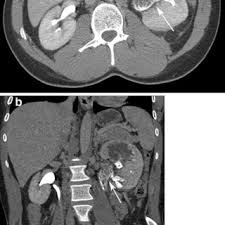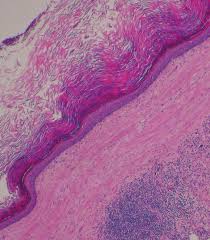
 Squamous metaplasia of the urothelium usually arises from chronic infection or mechanical irritation.
Squamous metaplasia of the urothelium usually arises from chronic infection or mechanical irritation.
If the urothelium is replaced by keratinizing squamous cells that are then shed into the urine, the condition is called keratinizing desquamative squamous metaplasia.
Urothelial keratinizing desquamativesquamous metaplasia can be idiopathic or related to existing GU processes including: chronic infection, stone disease, encrusting pyelitis, and malKoplakia.
KDSM is a pathologic adaptation of the urinary tract in which the native urothelial lining transforms to squamous epithelium with prominent keratin deposition.
Such metaplasia impairs urothelial integrity, leading to mucosal sloughing, and keratinaceous debris/plaques, that can lead to urinary stasis or obstruction.
Vitamin A has an essential role in epithelial integrity, and its deficiency has been shown to induce keratinizing desquamative squamous metaplasia in the urothelial tracts of animals.
Vitamin A is a fat-soluble vitamin that occurs in multiple chemical forms.
It is a transcription factor ligand with roles in gene regulation for morphogenesis, differentiation, and proliferation, which collectively are responsible for the integrity of epithelial tissue.
Vitamin A deficiency causes metaplasia and keratinization of the corneal and conjunctival epithelium, leading to ulceration, scarring, and blindness.
Vitamin A is essential for the formation and maturation of keratinocytes, which are epithelial cells that produce the structural protein keratin; deficiency leads to abnormal keratin protein differentiation and skin hyperkeratosis.
Patients who undergo operations that induce malabsorption by means of anatomical alterations, such as the biliopancreatic diversion with duodenal switch and Roux-en-Y gastric bypass, are at higher risk for nutritional deficiencies than those who undergo restrictive bariatric procedures, such as sleeve gastrectomy or gastric banding.
This metaplasia impairs urothelial integrity leading to mucosal sloughing.
The resulting keratinacious debris can lead to urinary tract stasis or obstruction and generates chronic genitourinary inflammation impairing the urothelial cell integrity, macrophage recruitment increased urinary inflammation and the production of pro-inflammatory cytokines.
Percutaneous renal surgeries recommended to remove keratin plaques that cannot be extracted through a ureteroscope.
